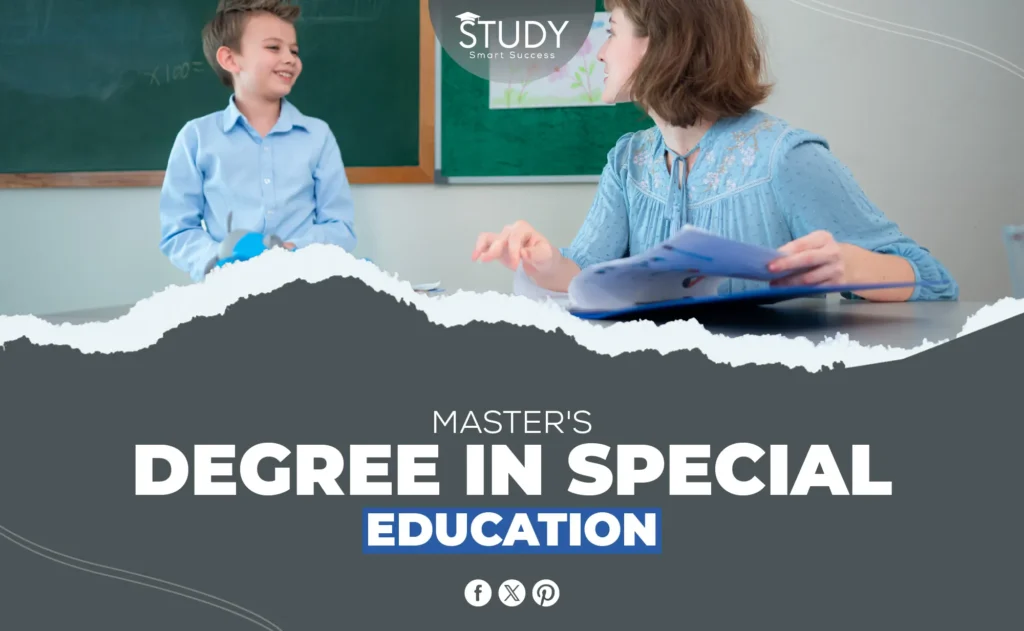The Path to a Master’s Degree in Special Education
Obtaining a Master’s Degree in Special Education is about unleashing the potential of all individuals, regardless of ability. In this revolutionary quest, we explore inclusive education, where all students are recognized and encouraged. We also explore the importance of advanced special education, which allows educators to change students’ lives with unique needs.
Discover this excellent professional development route’s potential, challenges, and rewards. Let’s navigate specialized knowledge, advocacy, and compassion to improve all learners’ futures. Welcome to a fantastic path toward unlocking potential and fostering diversity with a Master’s in Special Education.
The Significance of a Master’s Degree in Special Education
Advantages and Benefits of Pursuing a Master’s Degree
Master’s degrees in special education have many benefits. First, it comprehensively covers special education philosophy, research, and best practices. This advanced degree prepares teachers to meet the unique needs of kids with disabilities and learning differences.
A Master’s Degree allows special education teachers to specialize in autism spectrum disorders, learning difficulties, or behavioral therapies. This speciality allows them to better customize training and support to student requirements. In special education, a Master’s Degree often increases work options, salary, and job stability.
Impact on Career Opportunities and Advancement
A master’s degree greatly affects the employment prospects of special education teachers. Special education coordinators, program directors, and school administrators may also need graduate degrees.
Master’s degree instructors also have more specialized jobs and professional development possibilities. Their experience can enhance the profession as educational consultants, curriculum developers, or researchers. Earning a Master’s Degree opens many employment avenues and positions educators for career progression.
Contributions to Professional Development and Expertise
Master’s degrees in special education enhance professional development and experience. Educators learn evidence-based strategies and solutions for disabled kids through rigorous training, practical experiences, and research. Advanced abilities in evaluation, instructional design, behavior management, and family and transdisciplinary team collaboration are gained.
Master’s degrees in special education generally require research projects or capstone experiences that let educators put theory into practice. This hands-on experience helps them learn more and better prepare to handle the complicated issues facing disabled kids and their families. Master’s degrees in special education enable educators to contribute to the field and significantly improve students’ lives.
Exploring Master’s Programs in Special Education
Overview of Different Types of Master’s Programs Available
Master’s different Master’s programs in Special Education to meet the wants and goals of teachers and other professionals in the field. The following are some types of MasMaster’sograms:
Master of Arts (M.A.) in Special Education:
Most of the time, these programs focus on the theories, studies, and real-world applications of special education. You might be able to focus on behavior interventions, autism spectrum disorders, or learning challenges. Read more about Masters of Arts in Special Education.
Master of Education (M.Ed.) in Special Education:
Master of Education (M.Ed.) schools often focus on practical ways to teach, create lessons, and test students specific to special education settings. Some may also include policy, advocacy, and school leadership classes.
Master of Science (M.S.) in Special Education:
Suppose you want a Master of Science (M.S.) in Special Education. In that case, you will learn more about research and data analysis in special education. Students may have to do study projects or theses as part of the requirements for their degree.
Master of Arts in Teaching (MAT) with Special Education Concentration:
Master of Arts in teaching schools is for people who want to become teachers and get extra training in special education. Coursework in general and special education methods is typical in these programs.
Online and Hybrid Master’s Programs:
Many colleges offer Master’s or hybrid MasMaster’sograms in Special Education, giving working professionals or people who can’t attend regular classes on campus more options.
Curriculum and Coursework in Special Education Master’s Programs

The curriculum and courses in Special Education Master’s degrees vary by kind, concentration, and university requirements. These programs may cover items like:
- Foundations of Special Education Click here to read more about IDEA.
- Assessment and Evaluation of Students with Disabilities
- Differentiated Instruction and Universal Design for Learning (UDL)
- Behavior Management and Positive Behavior Support
- Curriculum Development and Adaptation
- Collaboration and Consultation with Families and Interdisciplinary Teams
- Legal and Ethical Issues in Special Education
- Research Methods and Data Analysis (for research-focused programs)
- Practicum or Field Experience in Special Education Settings
- Students may also be able to choose elective courses or concentrations tailored to their specific interests and career goals.
Accreditation and Program Quality Considerations
Accreditation and quality are crucial when researching Special Education Master’s programs. Look for CAEP or TEAC-accredited programs. Accredited programs meet high-quality criteria and offer a more complete and credible education.
When assessing program quality, consider faculty expertise, program reputation, graduation rates, licensure exam pass rates, and alumni outcomes. To find a program that fits your academic and professional goals, study, read student reviews, and talk to program administrators or professors.
Admission Requirements and Application Process
Academic Prerequisites and Qualifications
Admission requirements for Special Education Master’s programs differ per institution and program. However, typical academic requirements may include: Click here.
- A bachelor’s degree from a recognized school, ideally in education or a related field.
- A minimum GPA needs to be met, usually between 2.5 and 3.0 on a 4.0 scale.
- Coursework in teaching, psychology, or a related field is required.
- Scores on standardized tests, like the GRE (Graduate Record Examination); however, some schools may only require these or may let applicants in after taking a test.
- Recommendation letters from professors or employers.
- Statement of purpose or personal statement that explains why you want to get a Master’s degree in Special Education and what your academic and work background is.
Necessary Documentation and Application Materials
Master’s apply to MasMaster’sograms in Special Education; you will usually need to send in the following papers and documents:
- Complete the application form for the individual program or institution.
- Official transcripts from all colleges and universities you attended after high school show you have completed a bachelor’s degree and any required classes.
- Standardized test scores, like GRE scores, if asked for.
- Letters of recommendation from professors or employers who can talk about your skills and how likely you are to do well in the school.
- This is a personal statement of purpose outlining your academic and career goals, related experiences, and why you want to pursue a graduate degree in Special Education.
- A resume or curriculum vitae (CV) that lists your education, work history, volunteer work, and any related skills or certifications.
Some schools need portfolios with writing samples, teaching philosophies, education, or related field experience.
Tips for Navigating the Application Process Successfully
Master’s degrees in Special Education can be challenging to apply for, but you can succeed with proper planning and preparation. Tips for navigating the application process:
- Start early: Research programs and gather application materials early to ensure you have enough time to complete all criteria.
- Customize your application: To show your genuine interest and suitability for each program and school, tailor your statement of purpose, resume, and other application materials.
- Highlight related experiences: To demonstrate your qualifications for graduate study, including any Special Education-related academic coursework, work experience, volunteer activities, or certifications in your application materials.
- Request recommendation letters early: Contact references early in the application process to give them enough time to draft and submit solid letters of recommendation.
- Before submitting your final application, proofread and update all papers for spelling, punctuation, and formatting mistakes and ask peers, mentors, or advisers for comments.
Following these recommendations and remaining organized will help you submit a solid application highlighting your qualifications and preparation for Special Education graduate study.
Career Opportunities with a Master’s Degree in Special Education
Potential Career Paths and Job Roles
Those with a Master’s in Special Education can find fulfilling careers in the industry. Potential careers include:
- Special Education Teacher: This position teaches and assists special needs children in K-12 classrooms. Teachers in inclusive classrooms, resource rooms, or self-contained settings teach special education. For more information on how to become a special education teacher, read on.
- Educational Diagnostician: Assess students’ learning needs and disabilities, evaluate them, and create IEPs to assist their academic and social-emotional growth.
- Behavior Intervention Specialist: Use behavior management tactics, functional behavior assessments, and behavior intervention plans to improve challenging behaviors.
- Autism Specialist: Help people with autism spectrum disorders (ASD) learn social skills, communication, and behavior.
- Transition Specialist: Help disabled Students transition to employment, higher education, independent living, and community integration.
- Assistive Technology Specialist: Assess, select, and install assistive technology to help disabled students access the curriculum and participate in school.
- Special Education Administrator: This position leads school districts, special education cooperatives, or educational agencies in special education programs, policy, and state and federal compliance.
Demand for Special Education Professionals in Various Settings
Special education professionals are in high demand across various educational settings, including public and private schools, special education cooperatives, early intervention programs, community-based organizations, and residential facilities.
As the awareness of and need for inclusive education grows, so does the demand for qualified special education teachers, diagnosticians, behavior specialists, and other professionals who can support students with diverse learning needs.
Additionally, there is a growing need for special education professionals to work with culturally and linguistically diverse populations, as well as individuals with complex disabilities or co-occurring conditions.
Advancement Opportunities and Leadership Roles
Special educationMaster’sists with masMaster’sgrees can grow and lead. A National Board Certification in Special Education or Board Certified Behavior Analyst (BCBA) certification can boost job possibilities and lead to leadership roles.
Administrators, program coordinators, and directors shape special education policy, advocate for resources, and lead projects to enhance outcomes for disabled children.
Master’s graduates may also pursue doctoral degrees in special education or related subjects to expand their knowledge, skills, research, teaching, and scholarship prospects.
Conclusion
This blog has examined the importance of a Master’s Degree in Special Education, including program types, curriculum, admission requirements, and job options. We’ve covered the benefits of an advanced Special Education degree, including specialized knowledge, career progression, and professional development. We’ve also discussed special education instructors’ duties, positive behavior interventions, and inclusive schooling environments.
A Master’s Degree in Special Education is life-changing and fulfilling for ambitious educators and professionals who want to help disabled pupils. This advanced degree provides the knowledge, skills, and ability to support diverse learners and develop inclusive learning environments.
As you pursue a Master’s in Special Education, embrace continual learning and professional improvement. Special education is constantly changing, so educators must keep up with research, best practices, and trends. Lifelong learning and professional development will improve your teaching and advocacy for disabled kids. Commit to practice growth and improvement through continuous education, professional associations, or engagement with colleagues and experts. Let’s fight for disabled students’ rights and create inclusive and equitable education for all.


